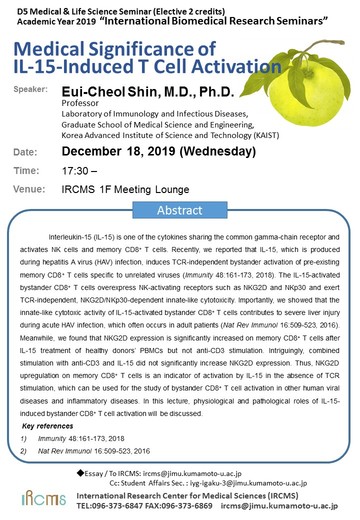- HOME
- News & Events
- [December 18]D5 Medical & Life Science Seminar-Prof. Eui-Cheol Shin, KAIST
News & Events
[December 18]D5 Medical & Life Science Seminar-Prof. Eui-Cheol Shin, KAIST
November 19 2019
The "D5 Medical & Life Science Seminar" course will be offered by International Research Center for Medical Sciences (IRCMS). It will run from April 2019 to March 2020, with lectures given by scientists who are affiliated with IRCMS or in collaboration with researchers at IRCMS. The lectures will be given once a month, in English, and by leading scientists in the relevant research field. Students will be taught: 1) how normal physiological functions are maintained in the human body; 2) how abnormalities in these systems (e.g., cancer) are studied using experimental models; 3) cutting-edge technologies (including single cell level imaging and omics analysis) used for mechanistic understanding of these abnormalities; 4) efforts and progresses in finding cure for human diseases associated with these abnormalities; and 5) importance of understanding disease mechanisms using cross-disciplinary approaches.
Date : December 18, 2019 (Wednesday)
Time : 17:30 -
Venue : IRCMS 1F Meeting Lounge
Speaker : Eui-Cheol Shin, M.D., Ph.D.
Professor
Laboratory of Immunology and Infectious Diseases,
Graduate School of Medical Science and Engineering,
Korea Advanced Institute of Science and Technology (KAIST)
Title : Medical Significance of IL-15-Induced T Cell Activation
Abstract :
Interleukin-15 (IL-15) is one of the cytokines sharing the common gamma-chain receptor and activates NK cells and memory CD8+ T cells. Recently, we reported that IL-15, which is produced during hepatitis A virus (HAV) infection, induces TCR-independent bystander activation of pre-existing memory CD8+ T cells specific to unrelated viruses (Immunity 48:161-173, 2018). The IL-15-activated bystander CD8+ T cells overexpress NK-activating receptors such as NKG2D and NKp30 and exert TCR-independent, NKG2D/NKp30-dependent innate-like cytotoxicity. Importantly, we showed that the innate-like cytotoxic activity of IL-15-activated bystander CD8+ T cells contributes to severe liver injury during acute HAV infection, which often occurs in adult patients (Nat Rev Immunol 16:509-523, 2016). Meanwhile, we found that NKG2D expression is significantly increased on memory CD8+ T cells after IL-15 treatment of healthy donors' PBMCs but not anti-CD3 stimulation. Intriguingly, combined stimulation with anti-CD3 and IL-15 did not significantly increase NKG2D expression. Thus, NKG2D upregulation on memory CD8+ T cells is an indicator of activation by IL-15 in the absence of TCR stimulation, which can be used for the study of bystander CD8+ T cell activation in other human viral diseases and inflammatory diseases. In this lecture, physiological and pathological roles of IL-15-induced bystander CD8+ T cell activation will be discussed.
Key references
1) Immunity 48:161-173, 2018
2) Nat Rev Immunol 16:509-523, 2016

